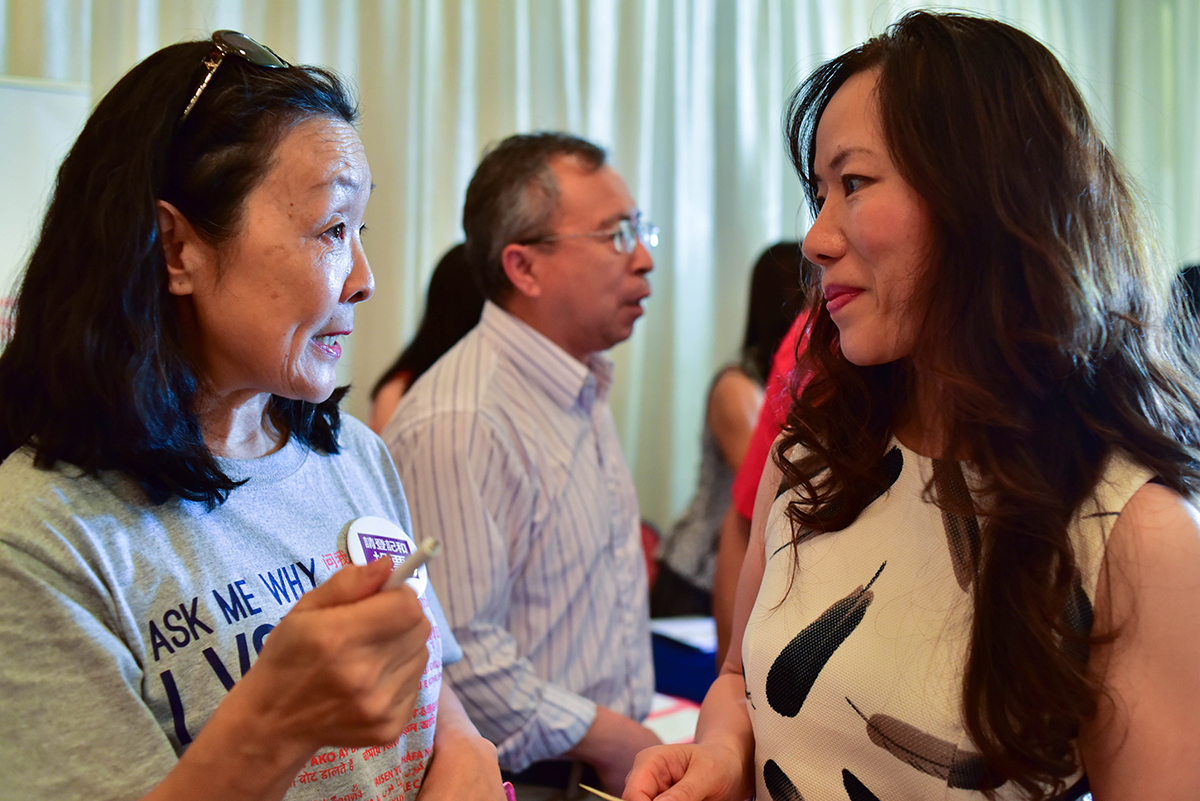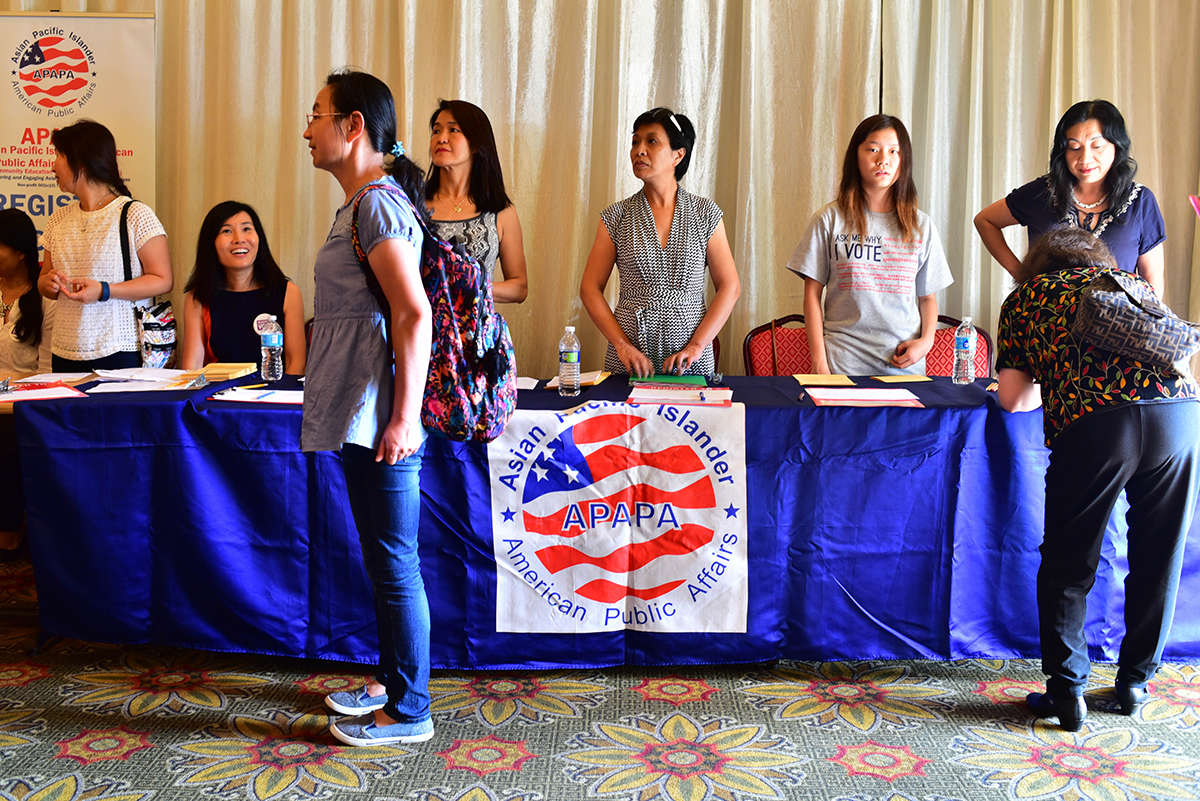Language Can Be a Barrier at the Polls for Some Asian American Voters
By Molly Smith
Reporting Texas

Alice Yi (left) speaks with Mei Zhou about registering Zhou to vote during a town hall meeting with Mayor Steve Adler on September 14, 2016. The event took place at the Chinese restaurant New Fortune on North Lamar Boulevard. Graham Dickie/Reporting Texas
For Reporting Texas
When Saurabh Das heads to the polls this election season, he’ll be able to do more than vote. He can be an interpreter for any Bengali speaker who needs help reading the ballot, as long as he’s not that person’s boss or union leader. Although Das is not fluent in his parents’ native language, he’s proficient enough to translate the candidate choices and ballot measures.
Das knows firsthand the difference interpretation can make for voters who aren’t native English speakers. In 2014, Texas law barred him from interpreting for his Indian-born mother in Round Rock because he wasn’t registered to vote in Williamson County. The Austin resident was registered in Travis County.
“She ended up not voting for a couple of things that she wanted to and mistakenly voted for something she didn’t mean to,” he recalled.
Thanks to a federal court ruling, this is the first election since 1986 in which Texas voters who are not fluent in English will be able to bring a friend, relative or someone else they choose to the polls as a translator, no matter where in Texas that person lives. Asian American civic groups hope the change will encourage more participation among the state’s growing Asian American electorate.
The number of Asian immigrants to Texas has doubled over the past decade, according to the Office of the State Demographer. In 2013, the most recent data available, 50,542 foreign-born Asians moved to Texas. According to the latest U.S. Census data, Asian immigrants now make up one-fifth of the state’s foreign-born population.
A 2015 Pew Research Center report estimates that Asians will become the nation’s largest immigrant group by 2065. Among immigrants who arrived within the past five years, Asians already outnumber Hispanics.
The language barrier is one reason why voter turnout for Asian Americans lags that of all races, with 47.3 percent of registered Asian voters participating in the 2012 presidential election, according to the Census. Turnout for Hispanics was 48 percent, 64.1 percent for Caucasians and 66.2 percent for African Americans.
Turnout for Asian American voters with limited English proficiency was nine percentage points lower than that of Asian American registered voters with a good grasp of the language in 2012, according to Asian and Pacific Islander (APIA) Vote, a national nonpartisan organization. “If we don’t vote, we don’t have a voice,” said Alice Yi, president of the Austin, Texas chapter of Asian Pacific Islander American Public Affairs Association (APAPA), who talked about issues important to Asian Americans at a September town hall with Austin Mayor Steve Adler.

Attendees to the mayoral speech pile into the ballroom of the Chinese restaurant New Fortune on September 14, 2016. There were many different Asian nationalities represented at the event, where volunteers helped register voters. Graham Dickie/Reporting Texas
Forty-two percent of Asian immigrants in Texas say that they speak English less than “very well,” which can be a challenge in a state where most Asian American voters don’t have access to a ballot in their native language. Harris County is the only one in Texas that is federally mandated to translate its ballots into Asian languages as well as Spanish. The county translates election materials into Vietnamese and Chinese because each group has more than 10,000 voting-age citizens who do not speak or read English well enough to fully participate in an election.
For Das, allowing someone to rely on a family member for interpretation is not only fair but also necessary in Texas, because Bengali speakers are scattered across the state and volunteer interpreters are few.
“Most Asian Americans with limited English language proficiency rely on their children to help translate, so [the interpreter provision] disproportionately affected Asian Americans,” said Jerry Vattamala, the Asian American Legal Defense and Education Fund (AALDEF) democracy program director. Children often are too young to vote or are registered in a different county, as in Das’ case.
In 2015, AALDEF, along with Das’ mother, Mallika, and OCA-Greater Houston (originally the Organization for Chinese Americans, the OCA represents all Asian and Pacific Island Americans) sued Texas, asserting that she was denied language assistance at the polls that is guaranteed by federal law.
In August, U.S. District Judge Robert Pitman in Austin ruled in their favor and barred Texas from enforcing the provision because it violated a 1982 amendment to the Voting Rights Act. Now, interpreters do not need to be registered voters in the county in which they are interpreting.
Whether the lawsuit will impact voter turnout remains to be seen, and it is difficult to measure given that the Texas Secretary of State does not track turnout by ethnicity.
“Standing alone, it’s probably not going to have a huge impact,” said Ramey Ko, the acting president of the Travis County Asian American Democrats and a former candidate for Travis County treasurer.
Rather, he described the interpreter provision as “part of an edifice of state regulations” that made it difficult for immigrant voters to participate in the electoral process, especially when the process is new to them.
Cal Jillson, a political science professor at Southern Methodist University, said that the interpreter provision is one of many ways Texas has historically tried to suppress voters.
“In earlier periods in Texas history [voter suppression] was very overt, and in more recent times it has been a little more indirect, but nonetheless very effective,” he said. Texas has historically used voter suppression tactics to maintain Republican control of the state, Jillson said.
Although Asian Americans are a relatively small segment of the national electorate, Vattamala said they have the potential to make a difference in tight races, especially at the local and county level.
Many Asian American civic organizations, including OCA-Greater Houston, are logging hours phone banking to encourage people to vote and to remind them that they have the right to bring an interpreter of their choice with them.
“A lot of people don’t realize it’s their civic duty and that they have a right to vote, especially for new immigrants — they didn’t necessarily come from a country where that was actually encouraged or where they had a right to [vote],” said Debbie Chen, civic engagement programs director for the organization.
Texas continues to assert that its law is legal and is appealing Pitman’s ruling to the 5th U.S. Circuit Court of Appeals. But it is following Pitman’s ruling while the case continues.
David Hoffman, a principal at Fish & Richardson in Austin who represented the plaintiffs in the lawsuit, said it is rare for states charged with Voting Rights Act violations to see a lawsuit through the end. “As far as I know, we’re the first state to really put up a fight,” he said.
Mallika Das died in June. Das said that his mother would have been humbled to see how her decision to challenge Texas’ election laws has become a step toward lowering some barriers immigrant voters face.
“It didn’t really hit me how impactful this would be for so many people until we won the case,” he said. “We often don’t think that our lives have too much more meaning than for those in our immediate circle.”
Reporting Texas is participating in Electionland, a ProPublica project that will cover access to the ballot and problems that prevent people from exercising their right to vote during the 2016 election.
